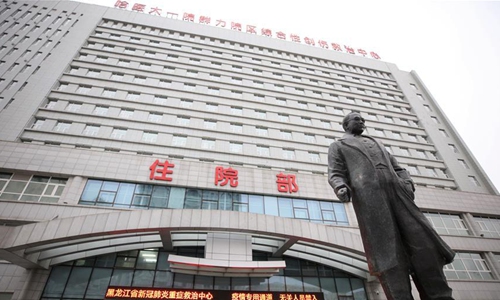4,106 under screening after clustered infections in two Harbin hospitals
By Zhang Han Source:Global Times Published: 2020/4/20 22:18:40

Qunli branch of the First Hospital of Harbin Medical University Photo: Xinhua
Clustered COVID-19 infections at two hospitals in Harbin, Northeast China's Heilongjiang Province have caused at least 4,106 people to undergo screening to determine whether they are close contacts.
Clustered infections in the city involved multiple places and have developed for more than two weeks, requiring other cities in Heilongjiang to join the retrospective screening work. The city of Qiqihar has found 1,685 people who have had shared routes with confirmed patients and silent carriers in Harbin, the Paper reported Monday.
Among the traced cases, 615 have been to two Harbin hospitals for treatment, attending or visiting patients. Some 106 people are undergoing central quarantine and all involved are having nucleic acid and antibody tests, according to the report.
Qiqihar's screening is based on an epidemiology investigation requirement issued by the provincial government. Clustered infections at the two Harbin hospitals have generated a screening list of 4,106 names, and 167 of them are Qiqihar residents.
The small outbreak started from a Chinese passenger who flew in from the US on March 19. The woman surnamed Han infected her neighbor and caused more infections after the neighbor's family held a dining party with friends.
The clustered infections in hospitals were traced to an 87-year-old patient surnamed Chen. Chen is a friend of the neighbor's family, who was admitted to Harbin Second Hospital on April 2 after suffering a stroke. He was transferred to the First Affiliated Hospital at the Harbin Medical University.
Harbin Second Hospital stopped accepting patients and will conduct thorough disinfection work.
There have been more than 50 confirmed patients and silent carriers in this infection chain. Infections related to the chain have also been reported in Fushun, Northeast China's Liaoning Province and Hulun Buir in North China's Inner Mongolia Autonomous Region.
Yang Zhanqiu, a Wuhan-based virologist, told the Global Times on Monday that the outbreak in Harbin has posed great danger to neighboring cities and regions, considering the population flow over the past few weeks.
A single loophole in the epidemic control system will have a big cost, and many more people will have to take risks and work harder to make up for the mistake, Yang noted.
On Friday, Heilongjiang Provincial Commission for Discipline Inspection announced that 18 Party, government officials and hospital chiefs were held accountable for failing to conduct anti-epidemic work in Harbin.
Posted in: SOCIETY